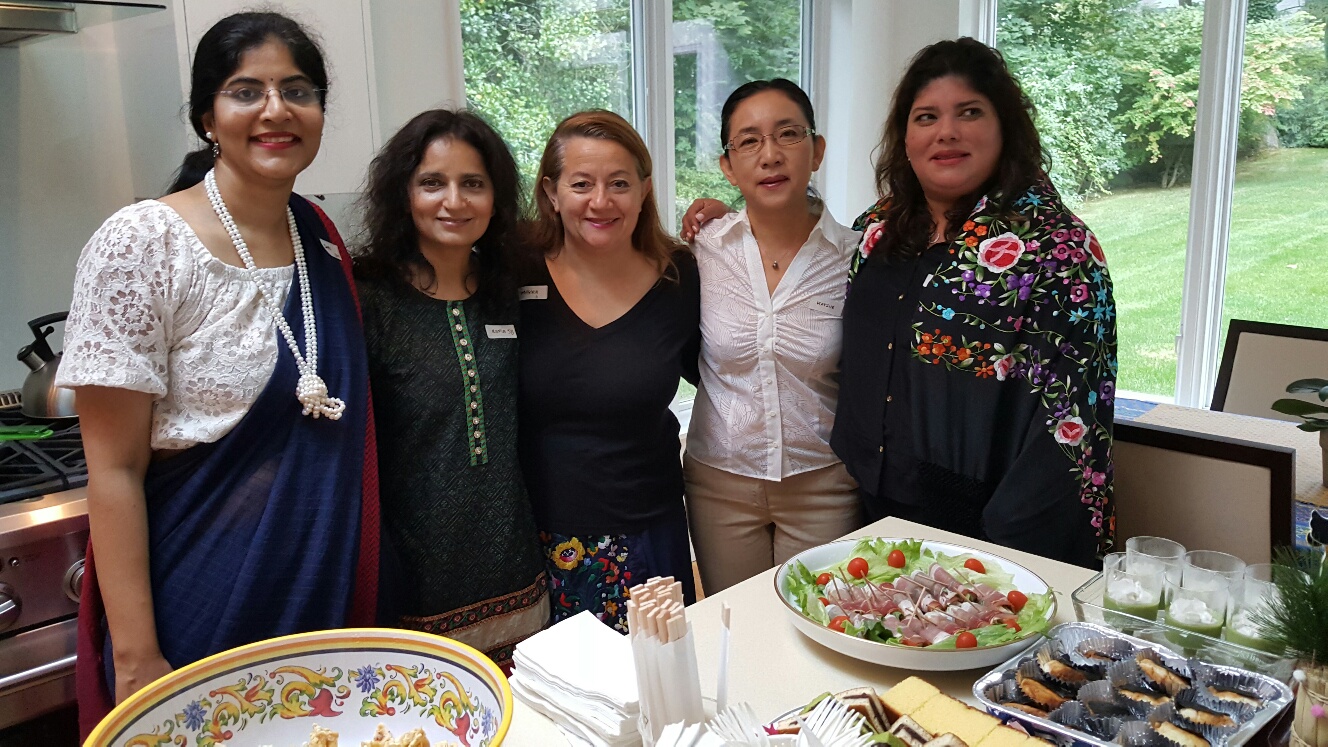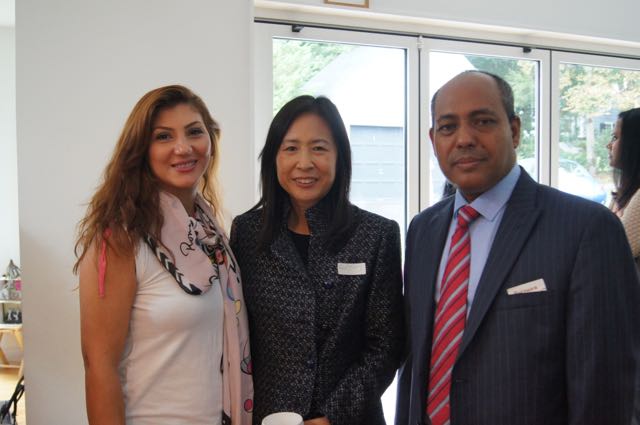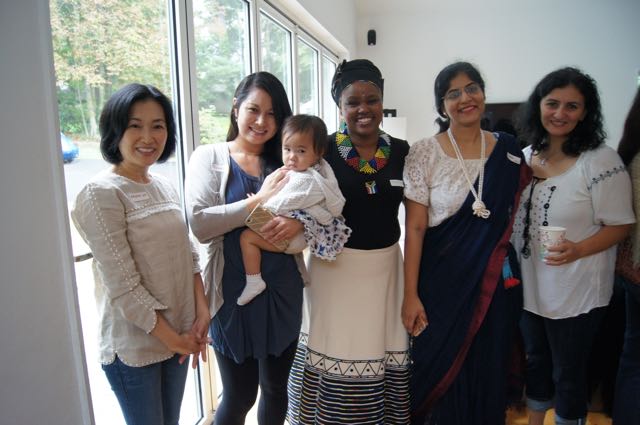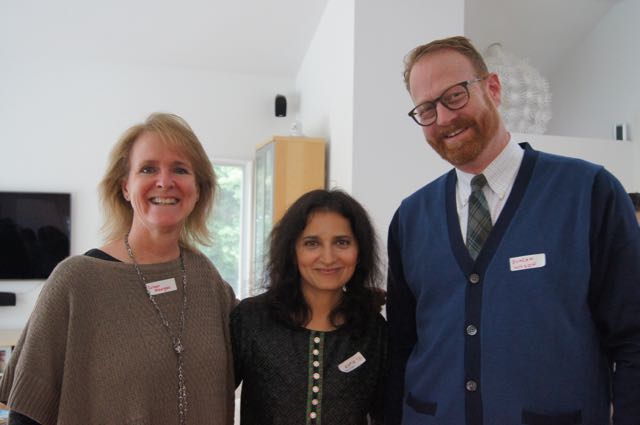Local Spanish Professor Publishes Book that Answers 101 Questions About Spanish
- Details
- Written by Joanne Wallenstein
- Hits: 6143
 Scarsdale native and Spanish Professor Judy Hochberg has published a new book, "¿Por qué? 101 Questions about Spanish" for anyone who wants to understand how Spanish really works. While standard textbooks and grammars describe the "what" of Spanish - its vocabulary, grammar, spelling, and pronunciation, Hochberg's book "¿Por qué," explains the "why." Why are so many Spanish verbs irregular?
Scarsdale native and Spanish Professor Judy Hochberg has published a new book, "¿Por qué? 101 Questions about Spanish" for anyone who wants to understand how Spanish really works. While standard textbooks and grammars describe the "what" of Spanish - its vocabulary, grammar, spelling, and pronunciation, Hochberg's book "¿Por qué," explains the "why." Why are so many Spanish verbs irregular?
Hochberg draws on linguistic principles, Hispanic culture, and language history to answer questions such as: Why does Spanish have different ways to say "you"? - Why is h silent? - Why doesn't Spanish use apostrophes? - Why does Castilian Spanish have the th sound?
Hochberg and her husband are both graduates of Scarsdale High School (1978) and married just days after their graduation from college in 1982. She earned her BA from Harvard and her PhD at Stanford, both in linguistics. She initially focused on how children learn to speak Spanish as a first language and then spent several years researching computational linguistics topics like automatic translation and speech recognition.
She worked at Los Alamos National Laboratory in New Mexico, and then for one year at a start-up in NY and three years at IBM's TJ Watson Research Center in Yorktown Heights, In 2004 she retrained as a Spanish teacher and taught at SHS from 2004 to 2009, and since then as an adjunct at Fordham University. She began work on the book in 2011 as a way to share her special perspective on Spanish as someone who is both a research linguist and a classroom teacher. She also blogs at Spanishlinguist.us.
She moved back to Scarsdale in 2000 and her three children graduated from SHS. The oldest two are married, and she has two grandsons in Philadelphia.
¿Por qué? is an accessible study guide that is suitable for Spanish students, instructors, native speakers, and the general reader. It is a valuable supplementary text for serious students of Spanish at all levels, from beginning to advanced. ¿Por qué? also covers topics usually left to specialized books, including the evolution of Spanish, how children and adults learn Spanish, and the status of languages that co-exist with Spanish, from Catalan to Spanish sign language to the indigenous languages of Latin America.
The book will be published on October 20th. Order your copy now.
Scarsdale Boys Volleyball Teams Builds Skills and Confidence in their First Season
- Details
- Written by Emmeline Berridge
- Hits: 3932
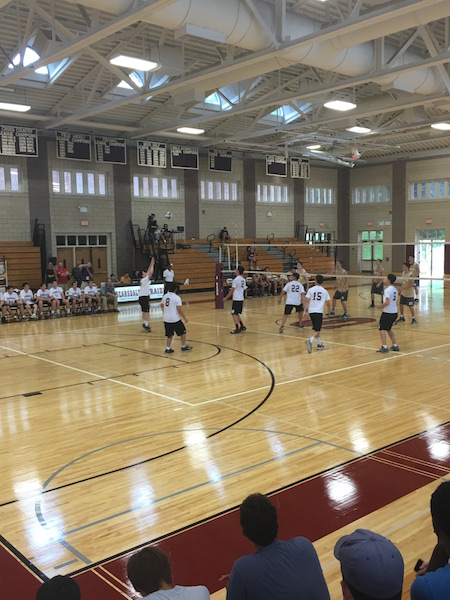 Going into his first ever school sanctioned volleyball game, Sophomore Charlie Quill said he felt "less experienced than [he] expected to feel on the court." This feeling was mutual among all of his teammates, as the Scarsdale Boy's Volleyball season opener was the first official boy's volleyball game played in the school's history. Although practices are similar to game situations, and according to Quill the team "takes [their] time developing as players seriously", game experience in invaluable when it comes to team camaraderie and overall confidence. The team is led by Senior Captain Jeremy Wolfe, whose interest for the sport peaked while managing the Section 1 Champion Girl's Volleyball team last year.
Going into his first ever school sanctioned volleyball game, Sophomore Charlie Quill said he felt "less experienced than [he] expected to feel on the court." This feeling was mutual among all of his teammates, as the Scarsdale Boy's Volleyball season opener was the first official boy's volleyball game played in the school's history. Although practices are similar to game situations, and according to Quill the team "takes [their] time developing as players seriously", game experience in invaluable when it comes to team camaraderie and overall confidence. The team is led by Senior Captain Jeremy Wolfe, whose interest for the sport peaked while managing the Section 1 Champion Girl's Volleyball team last year.
Unlike many other Scarsdale fall sports teams with up to 8 teams in their respective leagues, Boys Varsity Volleyball has a four team league including teams from Scarsdale, Clarkstown South, Clarkstown North, and Suffern. This means that the teams get the opportunity to play one another more frequently than in a larger league. As this year is Scarsdale's inaugural season they are the least experienced in the league. Quill noted that "The more games we complete, the more confident we will become on the court". So far this season, the team is 0-9. Although the boys' record doesn't seem impressive, their improvement from the beginning of the season is noticeable. In their first game against Clarkstown South on September 9th, Scarsdale lost 3-0. On October 5th, Scarsdale lost by just one set to the same Clarkstown South team, with a final score of 3-2. As the season continues, the Raiders are building their confidence and unity as a team. With 7 more games to play this season, they have plenty of opportunity to display their hard work and progress.
With their losing record, from an improvement standpoint, there's nowhere to go but up for the Scarsdale Boy's Volleyball team. Their next game is Monday, October 17th 4:00 pm at Suffern. The team's next home game is Friday, October 21st at 4:00 pm against Clarkstown North. Come to the games to support a historical inaugural season for Scarsdale Boy's Volleyball.
Your Skin: Questions and Answers from an Expert
- Details
- Written by Joanne Wallenstein
- Hits: 11495
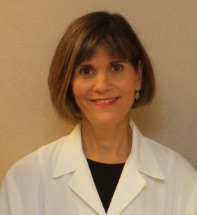 Dermatologist Dr. Jennifer Goldwasser is one of Scarsdale's most sought after specialists. With an impressive resume, she's a recognized expert in her field who is both respected and well liked by her patients. Now at the Scarsdale Medical Group she's the go-to person for any questions or issues with skin – and because it seems like everyone has concerns, we decided to ask her some questions. Here is what she shared.
Dermatologist Dr. Jennifer Goldwasser is one of Scarsdale's most sought after specialists. With an impressive resume, she's a recognized expert in her field who is both respected and well liked by her patients. Now at the Scarsdale Medical Group she's the go-to person for any questions or issues with skin – and because it seems like everyone has concerns, we decided to ask her some questions. Here is what she shared.
Are skin cancers more common now or are doctors just better at diagnosing them?
I believe there is a true increase in the incidence of skin cancer, AND that more are coming to light, due to greater public awareness and due to more prevalent screening.
What are the signs that a skin patch could require treatment?
Non-melanoma skin cancers, like basal cell carcinoma and squamous cell carcinoma, can look rather innocent: a pink pimple, a crusty spot, or a scaly flat pink patch that persists for over 1 month should be evaluated. Melanoma skin cancers tend to be irregular in shape and multicolored.
New spots that do not resemble other spots on the body are suspicious, and a lesion that changes over time, in size, shape, or color, is suspicious. Lesions that itch or hurt or bleed should be evaluated. Any persistent spot on the nose after the age of forty should be reported.
What are the most common types of skin cancers?
Basal cell carcinoma is the most common, followed by squamous cell carcinoma, followed by melanoma.
How do doctors usually treat basel and squamous cell carcinomas?
These can be treated in a number of ways: burning and scraping them away, cutting them out, radiation therapy, and even topical creams can be used--it depends on the location, size, and other characteristics of the lesion and the patient.
If left untreated, will squamous and basal cell lesions spread or metastasize?
These two types of skin cancer rarely metastasize.
How can parents prevent kids from getting sun damage early on?
Follow the ABC's: Make sure your children AVOID midday sun, wear BLOCK, and COVER up with physical cover-ups and shade structures.
What can adults who already have damaged skin do to protect themselves?
Don't add insult to injury! Follow the ABC's and do quarterly self-examinations, and seek attention if you find a suspicious lesion. See your dermatologist regularly for a full body skin exam. Eat plenty of fruits, vegetables, whole grains, nuts, and seeds, and drink brewed teas, which are rich in antioxidants. Don't smoke--smoking increase your risk of squamous cell skin cancers.
Which sun blocks do you recommend and why?
I generally recommend water-resistant sunblocks with at least an SPF of 30. I prefer products that contain zinc oxide and or titanium dioxide as the active ingredients--these are PHYSICAL sunblocks (as opposed to chemical sunscreens). They work by reflecting light as soon as they are applied, and will continue to work until they are washed off by water or sweat, or rubbed off. Several manufacturers produce sunblocks that meet these criteria: Blue Lizard, Neutrogena PURESCREEN, Elta MD, and MD Solar Sciences are some examples.
Some vitamin D exposure is necessary for good health – how can people balance this need with the risk of skin cancer?
Each person has to make health decisions on an individual basis. If you have a personal or family history of skin cancer, and/or if you are very fair-skinned, taking sun to increase your vitamin D level may not be the best way to go for you. If you are not high risk for skin cancer and you have a low Vitamin D level, you might benefit from cautious sun exposure.
Dr. Goldwasser can be found at the Scarsdale Medical Group, 259 Heathcote Road, Scarsdale, NY 10583, Phone: 914-723-8100.
A Multicultural Breakfast in Fox Meadow
- Details
- Written by Joanne Wallenstein
- Hits: 3863
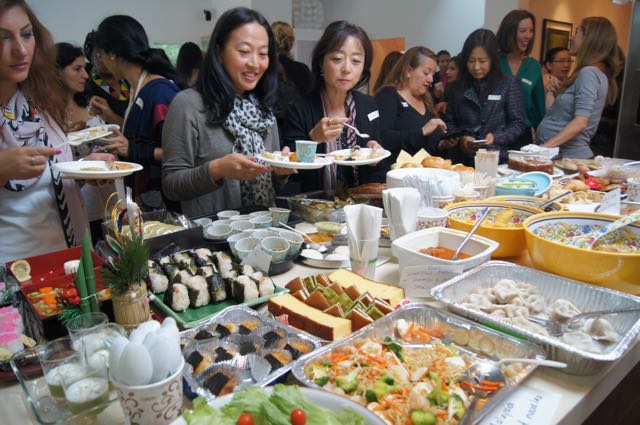 Fox Meadow residents from the world over celebrated multiculturalism at a delicious international breakfast on Friday September 30. Parents with children in the Fox Meadow school brought a sumptuous array of dishes to share including dumplings, sushi, noodles, green tea custard and many exotic specialties that made interesting breakfast fare.
Fox Meadow residents from the world over celebrated multiculturalism at a delicious international breakfast on Friday September 30. Parents with children in the Fox Meadow school brought a sumptuous array of dishes to share including dumplings, sushi, noodles, green tea custard and many exotic specialties that made interesting breakfast fare.
Principal Duncan Wilson greeted the group and shared a story – and everyone enjoyed greeting newcomers and catching up with old friends.
President Obama Quotes Six Year-Old Scarsdale Boy in U.N. Speech
- Details
- Written by Joanne Wallenstein
- Hits: 9545
 Does anyone know Alex? In his speech at the United Nations on Tuesday September 20th, President Obama quoted a six year-old boy named Alex from Scarsdale. In remarks about the crisis in Aleppo, Syria, Obama read from a letter he received from Alex who invited Omran Dagneesh, an injured Syrian boy to come live with him and his family and to be his brother.
Does anyone know Alex? In his speech at the United Nations on Tuesday September 20th, President Obama quoted a six year-old boy named Alex from Scarsdale. In remarks about the crisis in Aleppo, Syria, Obama read from a letter he received from Alex who invited Omran Dagneesh, an injured Syrian boy to come live with him and his family and to be his brother.
We doubt that Alex knew his words would be read at the Leader's Summit on Refugees at the United Nations when he wrote them – but he does us all proud.
Watch the video here – and read the transcript of Obama's speech here. And if you know Alex, please ask him to get in touch with us at scarsdalecomments@gmail.com or at 914-980-4803. We would love to speak to him:
Here is what the President said: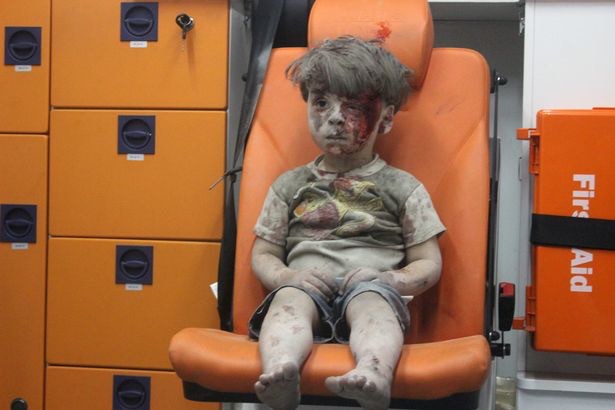
We can learn from a young boy named Alex, who lives not far from here in Scarsdale, New York. Last month, like all of us, Alex saw that heartbreaking image -- five-year-old Omran Daqneesh in Aleppo, Syria, sitting in that ambulance, silent and in shock, trying to wipe the blood from his hands.
And here in New York, Alex, who is just six years old, sat down and wrote me a letter. And he said, he wanted Omran to come live with him and his family. "Since he won't bring toys," Alex wrote, "I will share my bike and I will teach him how to ride it. I will teach him addition and subtraction. My little sister will be collecting butterflies and fireflies for him...We can all play together. We will give him a family and he will be our brother."
Those are the words of a six-year-old boy. He teaches us a lot.
The humanity that a young child can display, who hasn't learned to be cynical, or suspicious, or fearful of other people because of where they're from, or how they look, or how they pray, and who just understands the notion of treating somebody that is like him with compassion, with kindness -- we can all learn from Alex. Imagine the suffering we could ease, and the lives we could save, and what our world would look like if, seeing a child who's hurting anywhere in the world, we say, "We will give him a family and he will be our brother."
Note from the Editor: On September 22nd we received this note from Roy Gordon offering a free bicycle to Omran: He says, "Hello My name is Roy Gordon. I was hopping you could help me. I live in Ohio and after reading the story about the 6 year-old boy that wrote President Obama the letter I broke down in tears. What got me is generosity this little boy had and how this child can teach all of us a valuable lesson about sharing. So i wanted to share a gift of brand new bike. I do assembly and repair work for a company. I often come across brand new bikes that get returned to the company that were never used. I happen to have one that I safety checked and I would like to give it to this boy who wrote the letter so he could give it to the boy from Syria if and when he comes. You can contact me via this email address If you can help me out I would greatly appreciate it."
(Please contact scarsdalecomments@gmail.com and we will put you in touch with Roy)














